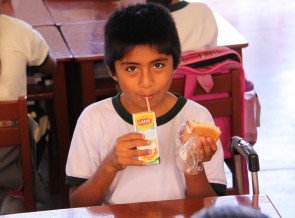2017 Blog – Safe Nutrition for Children in Peru
By Klaus Plenge, Key Account Director, Tetra Pak Peru.
Known as ‘Qali Warma’, the school feeding programme in Peru delivers milk and other nutritious products to millions of children aged three to five across eight regions in Peru, including coastal areas, mountainous regions and the capital city, Lima, home to more than 30% of the population. The programme also has a strong educational element, teaching children about the importance of healthy eating, the personal hygiene, recycling and protecting the environment. During 2017 we expect that more than 250 000 children will get milk in our packages.
We took the first step to get involved several years ago when starting to talk to the government about the school feeding programme. Together with Tetra Laval Food for Development we could share our expertise, examples, best practices and all the support that we can give to them in terms of school feeding. The government was looking for an easier, safer solution. So, along with the World Food Programme and Food for Development, we carried out an assessment and made recommendations. In 2015, the opportunity arose to start supplying enriched milk and milk with cereals beverages in Tetra Brik® Aseptic packages with our customers. Subsequently, we continued working with food processors on formulation and packaging design and the new products were ready by March. Now around 25% of the products that are being distributed through the school feeding programme are ready-to-drink products and the other 75% requires further preparation.
We share our expertise and real success cases around the world, share how we help to integrate all the cycle, improve formulations, ensuring that each portion delivers maximum nutritional benefit. But perhaps the other most significant contribution is in helping to build bridges between the public and private sectors. In these kinds of programmes, it is important to work as a team with the food processors and invite them to participate and offer a very good product for the children. Another important support is our knowledge and expertise in recycling. It is also important to work with the schools and the operators of the programme to collect the packages and send them to the recycle industry and close the life cycle of the package.
We made a survey during the first months of the programme and the result was amazing; more than 80% of the children showed a positive acceptance of the product and the package. This is the reason why we have to continue on this way and continue working for the future of the country.
My focus is to continue working with all stakeholders – the government, local producers and Tetra Pak – to support the future of the programme. We have to continue to find different products, not necessary dairy products. Fruit juices, new flavours and ready to drink solutions will bring healthy nutrition to the children. The most important priority is, in alliance with the food processors, to make food safe and available, everywhere. Finally, as I mentioned before, it is also important to connect the recycle industry and work very hard with environmental protection.
There are so many rewarding aspects of my work… Seeing the children’s faces when they get their drinks, and knowing that they are getting safe nutrition. Knowing that their chances of having a healthy future is priceless. But I’m also really delighted that we are delivering the same products to the school feeding programme as we do to the commercial market: these children are getting the best. It’s something exciting and inspirational. I’d also like to think that we have helped to raise standards across the programme as a whole, and that we can continue to build a stronger supply chain here in Peru so that the benefits of the school feeding programme are felt as widely as possible.




Leave a Reply
You must be logged in to post a comment.